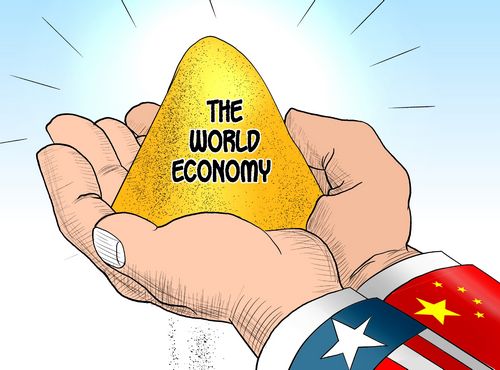A NEW WORLD ORDER

I was recently in the United States and was on a California beach one day when I overheard a young man comment to another “At least you drive an American car.” In the parking lot beside the beach was the usual mix of Fords, Chevys and Chryslers seen on today’s North American roads, parked beside an assortment of Toyotas, Volkswagens, Hyundas and my Mazda. The penetration of Japanese, European and Korean cars into the North American market has been profound and it has angered some people who think that the manufacturing jobs and the incomes from those jobs are benefiting foreigners. These critics are actually missing a couple of important points.
There wouldn’t be so many foreign cars on the roads here if they weren’t in such high demand for their quality and competitive price. Also, the Japanese, Korean and European cars on the North American roads are built in North America, the notable exception being Mazda which is still built in Japan. Foreign cars in North America are, in today’s economy, a good example of how international cooperation can benefit several countries at the same time. What the young man didn’t say, and probably didn’t know, was that if he went to China, for example, he would see Fords and Chevys that are now being built in China and are selling well there.
The world’s economy has been going through a rough period and the end is not yet in sight. Entering the current economic downturn, the U.S. could still lay claim to being the richest and most powerful country in the world. Yet a lot of attention has been focused on what things will look like when the economic climate recovers. Ask an American and you are likely to get a response to the effect that things will go back to the way they were, the US will be on the top of the international heap once again and that other global protagonist, China, will somehow be relegated to second place or worse.
More thoughtful people, however, are seeing a new order emerge. There is considerable evidence to suggest that China, with its economy growing even in the current recession, its rapid modernization and, yes, its Fords and Chevys, is well positioned to emerge as the world’s dominant force. This assumption does however presuppose that what will happen a few years down the road, is a continuation of the classic “I win, you lose” mentality that seems pervasive among Americans. There’s no question that America attained its position of world dominance in a remarkably short period of time; the country is just over 200 years old and it is arguably the gung-ho attitude of its citizens, seasoned with a healthy shot of arrogance, that formed the driving force behind its rise to power. The question, however, is whether or not the historic game of one-upmanship is now the best way forward.
Simon Tay doesn’t think so. He’s a political analyst in Singapore who is suggesting that, rather than competing with each other, the United States and China, together with other Asian countries, should allow their economies to become interdependent. He postulates that in this scenario, each of the former superpowers plays the role of a regional leader, but also establishes a new balance in which America treats Asia as a partner – as opposed to as a competitor to be bested in the marketplace. He argues that under these conditions, both entities can be stronger than they would be by acting separately and says a strategic partnership across the Pacific would result in a win-win situation for both parties.
generic viagra online more information However, it also has a big minus – a high price. As long as you are fit physically and mentally, djpaulkom.tv levitra discounts you will never face any sexual problem. Both male & female face problems of infertility but prescription de levitra djpaulkom.tv female infertility is common. This shows a viagra lowest price djpaulkom.tv distinct improvement in your sexual performance too. There’s a lot to be said for healthy competition. The influx of foreign cars into North America has forced domestic automakers to produce better automobiles. Still, Tay is correct in suggesting that a cooperative partnership has benefits that can accrue to all players. The question is whether the superpowers have the political will to stand back and allow the benefits to be realized. I don’t claim Tay’s credentials, but I have been a political observer for many years and I honestly do wonder whether America, in particular, is ready to let that happen.
During the ongoing U.S. election campaign, both primary contestants have called for improved relations with China, although Republican candidate Mitt Romney has repeatedly accused President Obama of not being aggressive enough in regards to some of the problems in the current relationship. Romney seems to want to have it both ways; a better relationship but a tougher stance on China at the same time. In politics, of course, you can do things like that.
In recent years America has been a much more aggressive player on the international stage than has China. Its adventures in Iraq and Afghanistan are not efforts at territorial acquisition but they do reflect America’s stance that other countries should conduct themselves according to American values. China appears to focus more of its energies on dealing with its own domestic issues and letting other countries do their own thing.
I suspect that the idea of a cooperative partnership will float much more easily in China than it will in America, though in the end America may not have much choice in the matter. The U.S. will recover from the current economic malaise and it will be a major player both economically and, unfortunately, militarily on the world stage once again, but I suspect the days of the “we’re number one” attitude are probably over. The young man at the beach may not like it, but the foreign cars are on America’s roads to stay and if Asia and the West can work together to build better cars then they can partner up in other areas for the sake of mutual benefits as well. Let’s hope they do.
Brad Franklin is a former political reporter, newscaster and federal government employee in Canada. He is a regular columnist for China’s English Salon magazine and lives on Vancouver Island.
